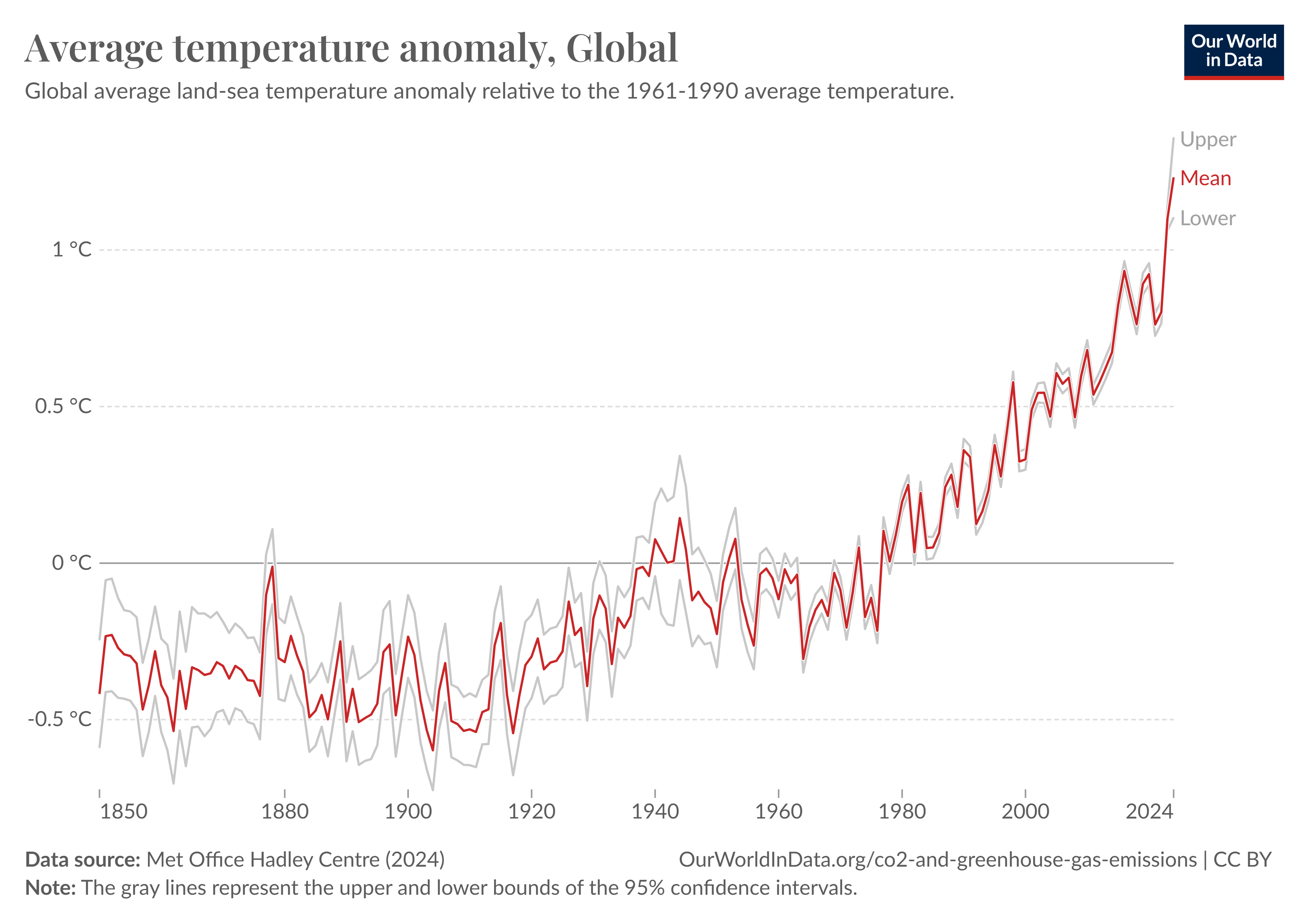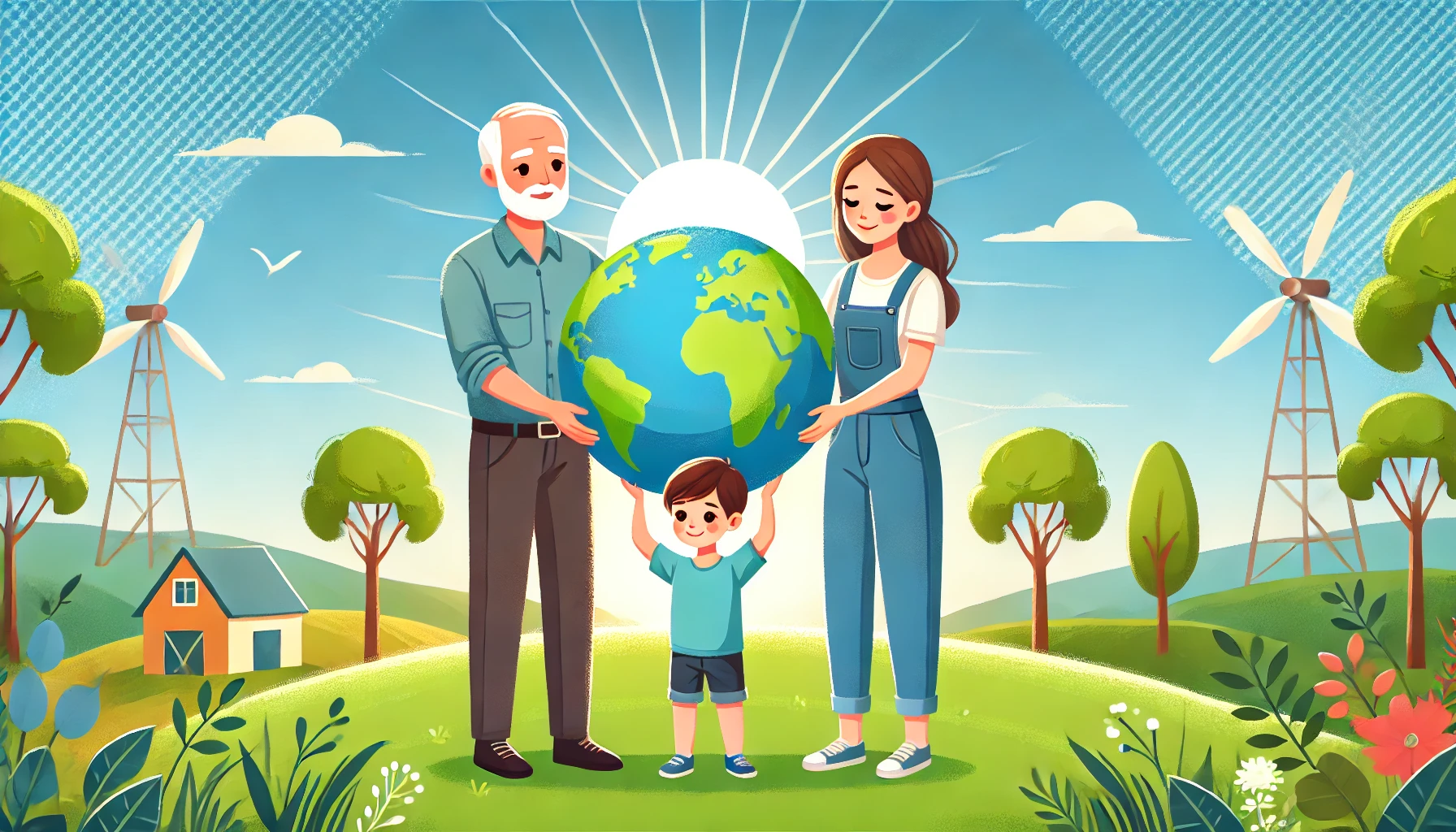By Kristi Sturtz, ALM, AICP
Climate change is a significant topic of concern for society. A general uncertainty seems to exist regarding the reasons, risks, and impacts of our changing climate, as well as a lack of understanding about what to do to prepare our families and communities to mitigate and adapt to the oncoming changes. Through this Climate Change series of blog postings, I will unpack some foundational information to help provide more clarity to the issue.
What is Climate Change?
Climate change refers to significant, long-term changes in the average weather patterns on Earth. It is not just about warmer temperatures; it encompasses a range of changes, including shifts in precipitation patterns, increased frequency of extreme weather events, ocean acidification, and rising sea levels.
Why is Climate Change Happening?
The primary cause of climate change is the emission of greenhouse gasses (GHGs), such as carbon dioxide (CO₂), methane (CH₄), and nitrous oxide (N₂O). These gasses trap heat in the atmosphere, creating a “greenhouse effect” that alters the composition of the atmosphere and warms the planet. The speed of warming is being accelerated by human activities. The burning of fossil fuels (coal, oil, and natural gas) for energy, deforestation, and certain agricultural practices have significantly increased the concentration of these gasses in the atmosphere.
How Do We Know Climate Change is Happening?
Greenhouse Gas Warming Effect: Greenhouse gasses work by allowing sunlight to enter the atmosphere and warm the Earth’s surface. However, they prevent some of the heat from escaping back into space, leading to a warming effect. This phenomenon is well-understood and has been observed and measured over time.
Carbon Dynamics: Carbon is a fundamental element in the Earth’s systems. It is stored in various forms, such as in the atmosphere as CO₂, in plants and animals, and in fossil fuels. Human activities release stored carbon into the atmosphere. For example, burning fossil fuels releases carbon that was stored underground for millions of years.
Carbon Storage and Release1: Currently, human activities release about 40 billion metric tons of CO₂ annually, compared to preindustrial levels where natural processes maintained a balance of carbon release and absorption. Since the industrial revolution, CO₂ levels have risen from about 280 parts per million (ppm) to over 419 ppm as of 2023.
Global Temperature Increases: Since the industrial revolution, global temperatures have risen by approximately 1.1 degrees Celsius (1.9 degrees Fahrenheit) according to the Intergovernmental Panel on Climate Change in 20232. This seemingly small increase is having significant impacts. This rate of increase is unprecedented when compared to historical temperature changes, which typically occurred over thousands of years. June 2024 was the 13th month in a row with record warm temperatures and 2024 is likely to be the warmest year on record.3
Observable Changes: The effects of climate change are visible in our daily lives. For example, ice melt in polar regions, such as the Arctic and Antarctic, has accelerated, contributing to rising sea levels. According to NASA, global sea levels have risen by over 200 mm since 1900 and by over 100 mm since 1995.4
Measuring Carbon and Historical Climate Data
Scientists can distinguish between carbon released by human activities and natural sources by analyzing carbon isotopes. Carbon from fossil fuels has a different isotopic signature than carbon from natural sources, allowing scientists to track human contributions to atmospheric CO₂.
Ice cores provide valuable records of past climate conditions. By drilling into ice sheets and analyzing trapped air bubbles, scientists can measure past concentrations of greenhouse gasses and infer historical carbon dioxide levels. These records show a clear correlation between increased CO₂ levels as shown in Figure 1, global population increases in Figure 2 and higher global temperatures as shown in Figure 3.
Figure 15

Figure 26

Figure 37

Why Should We Care?
Climate change affects everyone in ways that we are just beginning to understand. It impacts our health, economy, food security, and national security. Addressing climate change is not just an environmental issue; it is a human issue that requires collective action.
By understanding the science behind climate change and recognizing its far-reaching effects, we can come together to implement solutions that mitigate its impact and enable us to adapt to a new way of living. Whether through supporting clean energy initiatives, promoting conservation efforts, or advocating for policy changes, everyone has a role to play in addressing this critical issue and creating a more sustainable future for all. Let’s unite in our efforts to combat climate change, ensuring a healthy and thriving planet for future generations.
Read: Climate Change Series – Part 2
- Lindsey, R. (2024). Climate Change: Atmospheric Carbon Dioxide. U.S. National Oceanic and Atmospheric Administration. https://www.climate.gov/news-features/understanding-climate/climate-change-atmospheric-carbon-dioxide ↩︎
- IPCC, 2023: Summary for Policymakers. In: Climate Change 2023: Synthesis Report. Contribution of Working Groups I, II and III to the Sixth Assessment Report of the Intergovernmental Panel on Climate Change [Core Writing Team, H. Lee and J. Romero (eds.)]. IPCC, Geneva, Switzerland, pp. 1-34,
doi: 10.59327/IPCC/AR6-9789291691647.001 ↩︎ - Rohde, R. (2024). June 2024 Temperature Update. Berkley Earth. https://berkeleyearth.org/june-2024-temperature-update/ ↩︎
- NASA’s Goddard Space Flight Center. (2024). Sea level. https://climate.nasa.gov/vital-signs/sea-
level/?intent=121 ↩︎ - NASA. (2024). Carbon Dioxide. https://climate.nasa.gov/vital-signs/carbon-dioxide/?intent=121 ↩︎
- Roser, M., Ritchie, H. (2023). How has world population growth changed overtime? OurWorlfInData.org. https://ourworldindata.org/population-growth-over-time#article-citation
Data Source: UN World Population Division ↩︎ - Ritchie, H., Rosado, P., Samborska, V. (2024) Climate Change. OurWorldInData.org. https://ourworldindata.org/climate-change
Data Source: Met Office Hadley Centre. (2024) ↩︎


